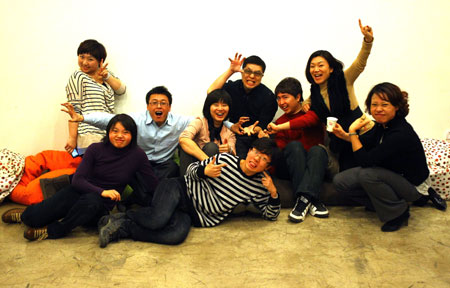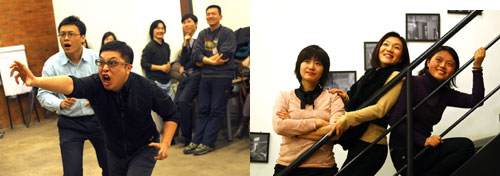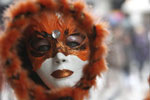People
Rough cuts
Updated: 2011-02-25 07:53
By Chen Nan (China Daily)
|
 Hu Xin (fourth from left), Linda Lee (second from right) and the amateur performers from People's Republic of Improv. photos by Zou Hong / China Daily |
Improvisational acting is the latest fad of the 20-45 age group in urban areas. Chen Nan reports.
It's 7:30 on a Tuesday evening and Hu Xin is whipping up a storm inside a high ceilinged house in Fangjia Hutong, Beijing. She is joined by more than 30 people standing in a circle. They do imitations of each other using ludicrously exaggerated gestures. After this warm up, it's time for what they have gathered to do - improvisational (improv) acting. Three people come to the center of the circle, one acting as a TV host, one as a relationship expert, and the third as a translator for the expert. "My first question is: What's the essence of love?" the host asks. Following the expert's ridiculous explanation, the translator ponders a second before saying, "One runs away and the other runs after", provoking much laughter from the audience.
All through the 90-minute session, the participants play different roles in the various story settings chosen by the audience, their dialogues witty and spontaneous, even jumping and shouting, if so required.
"Although the actors are amateurs, their performances and skills in connecting lines and extending the stories are great," says Hu, who founded the improv acting workshop in 2009.
"Improv acting requires keen listening and quick responses from the participants. Usually the acting, which is raw and comes with no preparation, has a comic effect," Hu says.
 |
|
Improvisational acting, using exaggerated gestures and witty dialogue, |
The workshop, called People's Republic of Improv, is held every Tuesday night and the group has performed at universities and small theater venues in Beijing.
"Although improv acting is from the West, Chinese people, especially the young, have picked it up quickly and made it a part of the local scene," says Linda Lee, the other founding member of the workshop. Her company, Acewood (Beijing) Consultancy, has backed the activity since June 2009.
Lee, who is from Hong Kong and was educated in Canada, adds that "people usually think the Chinese are conservative and shy but I don't think so. At the workshop, they are creative and active, and hardly fit the stereotype. For example, the Chinese are considered good at math but I am poor at it."
Hu says she first encountered improv as a student in France in 2004. And then she met Lee, who shared her interest in improv. Before launching the People's Republic of Improv, they both went to New York to study improv acting.
When they first posted information about it online, only a few people showed interest in joining in. But in just eight months, the workshop was drawing more than 30 members every week, mainly students and office workers, ranging in age from 20 to 45.
Shi Qiong, 34, a Beijing-based office worker, has attended the workshop since it was founded. She is joined by her engineer husband, Li Yan, who shares her passion for improv acting. The workshop helps relieve the stress of work and builds their communication skills, they say.
 |
"We were all strangers in the beginning but slowly people opened up and played together. We not only discovered that we had the potential to act but also enjoyed ourselves after a busy day," Shi says.
Her husband agrees. "(For the time we are here) we forget who we are. It's not a one-man show but requires teamwork," he adds.
Hu and Lee say every week new people join in and the improv acts have thrown up many talents. Their hope for the future is to have regular performance opportunities.
"They (the participants) are great actors and all they need is a platform," Lee says. "I am planning to seek a bigger place now that we have more people coming in."
As a form of entertainment, improv acting was first brought into Beijing by Beijing Improv, a bilingual performing workshop founded by Swiss national Lottie Dowling and American Jonathan Palley in 2006.
While it was started mainly for expats, now 60 percent of its members are Chinese. Beijing Improv holds regular activities every week and every one of their shows of the past three years have been sold out.
"There were no empty seats," says Palley, a technology entrepreneur who has lived in Beijing for nearly five years. He says that even in the beginning, the Chinese participants, although quiet, were creative.
"The most important thing about improv acting is not the performing itself. It's the philosophy behind it," Palley says. "We gather together to explore our lives in Beijing despite our different cultural backgrounds."
Hu and her group plan to participate in the second annual Beijing Improv Interactive Arts Festival to be held in April. The week-long event, launched by Beijing Improv, will see actors from Shanghai, Tokyo and Seoul performing at theater venues across the capital.
Specials

NPC & CPPCC sessions
Lawmakers and political advisers gather in Beijing to discuss major issues.

Self-made aircraft
An automobile mechanic in Northeast China made a test flight of his self-made aircraft which cost about US$395.

Venetian Carnival
Masked revellers celebrate in Saint Mark's Square in Venice.